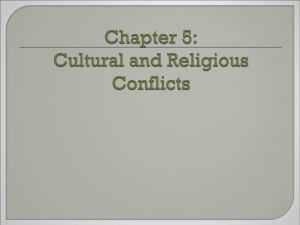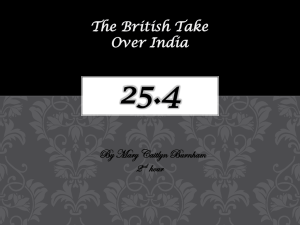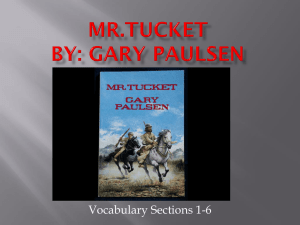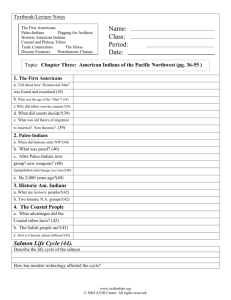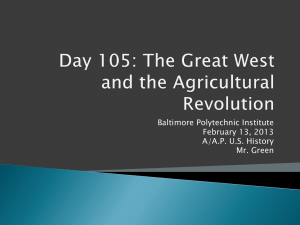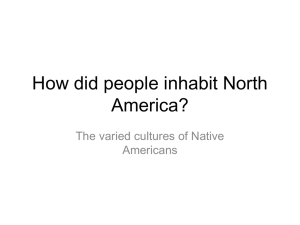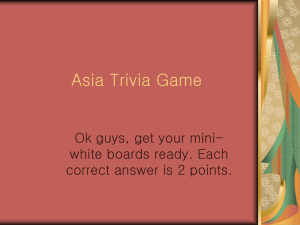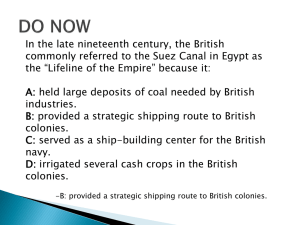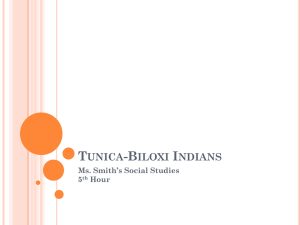Chapter 3 American Indian Cultural Regions
advertisement
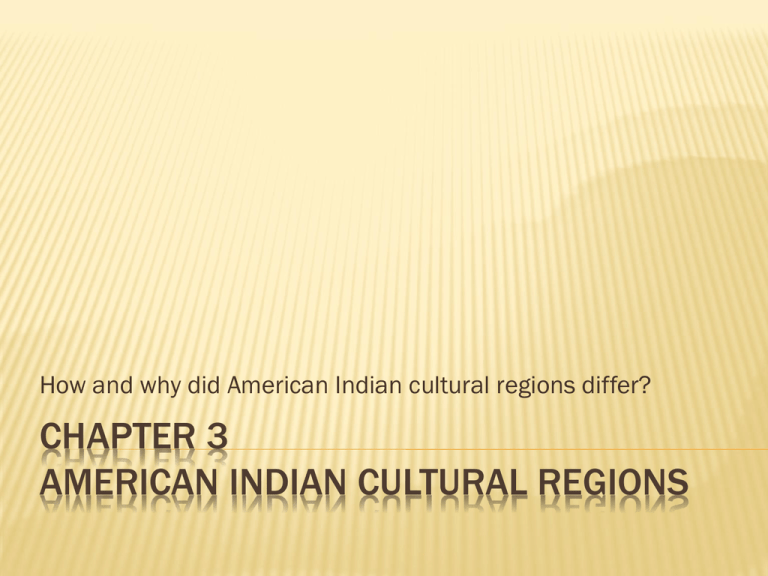
How and why did American Indian cultural regions differ? CHAPTER 3 AMERICAN INDIAN CULTURAL REGIONS 3.1 INTRODUCTION Adapting to surroundings Variety Ways of cultures of living American Indians Settled Nomadic Cultural Regions 7 different regions Use artifacts to determine regions 3.1 INTRODUCTION Artifact Human-made object that helps us understand how the people who made them lived Hopi’s use clay pots to store food Indians in the Northwest uses wooden boxes why>? 3.2 AMERICAN INDIANS OF THE NORTHWEST COAST Lived on a narrow strip along Pacific Coast South of Inuits Geography Dense fir, pine, cedar grew to the coastline Settled Mild climate Heavy on rocky beaches rainfall Wildlife Fish, whales, deer, elk, mountain goats, bears, wolves 3.2 AMERICAN INDIANS OF THE NORTHWEST COAST Shelter Kwakiutls Totem used would from forest poles outside each home Clothes Cedar bark Protect from rain Also used for rope Fishing nets and traps 3.3 AMERICAN INDIANS OF THE CALIFORNIAINTERMOUNTAIN REGION Inland from pacific coast Southern California Sierra Nevada Great Basin Various Environments Great Basin=dessert California=milder climate Tribes/Nations/Families Shoshones, Paiutes, Miwoks, Pomos 3.3 AMERICAN INDIANS OF THE CALIFORNIAINTERMOUNTAIN REGION Homes Ice cream Using nature Shells and beads Roots, branches, grasses, reeds, etc 3.4 AMERICAN INDIANS OF THE SOUTHWEST Driest cultural region Southwestern United States – Northern Mexico Mountains, mesas, canyons, and deserts Little rainfall & extreme temperatures Tribes Apaches nomadics Hopis settled 3.4 AMERICAN INDIANS OF THE SOUTHWEST Homes Stone and adobe Cliff dwellings pueblos Clothing Wore cotton Weaving for blankets and cloth Dyes and decorations Food Clay pots 3.5 AMERICAN INDIANS OF THE PLATEAU Between the Cascade and the Rocky mountains Flatlands, rolling hill, and gorges Include Canada and states Summers and winters Little rainfall Water from rivers Tribes Nez Perces, Spokanes, and Yakimas 3.5 AMERICAN INDIANS OF THE PLATEAU Natural environment Plants and animals Deer and bear Jackrabbits fish Forests Thick grasses, berries and camas Culture Underground homes Grass clothing Digging stick 3.6 AMERICAN INDIANS OF THE GREAT PLAINS East of the Plateau Rocky Mountains to Mississippi Valley Canada to Texas Mostly treeless grassland Many animals buffalo Tribes Cheyennes, Pawnees, Comanches, and Sioux 3.6 AMERICAN INDIANS OF THE GREAT PLAINS Buffalo considered sacred Extremely valuable teepee How were buffalos used? 3.7 AMERICAN INDIANS OF THE EASTERN WOODLANDS Mississippi River to the Atlantic Ocean Four seasons Rain=streams and rivers Birch, oak and maple trees Turkey, deer and beaver Tribes Iroquois Mohawks, Senecas Algonquin Mohegans, Delawares 3.7 AMERICAN INDIANS OF THE EASTERN WOODLANDS Homes Wigwams Winter and summer Clothing Deer hide and other animal skins Capes from turkey feathers Canoes Multiple trees Light weight 3.8 AMERICAN INDIANS OF THE SOUTHEAST Ohio Valley to Gulf of Mexico and Texas to Atlantic Ocean River valleys, mountains, coastal plans, and swamps Hot weather Seminoles lived in the Florida Swamplands Various plants Deer, alligators, fish and snakes Creeks lived in Georgia and Alabama Became Seminoles under Spanish rule Escaped slaves also joined the tribe 3.8 AMERICAN INDIANS OF THE SOUTHEAST Homes Chickees Wooden platforms Slanted roof No walls Clothes Leggings Canoes for protection READING FURTHER The Makahs READING FURTHER The Taos READING FURTHER The Iowas READING FURTHER The Senecas
